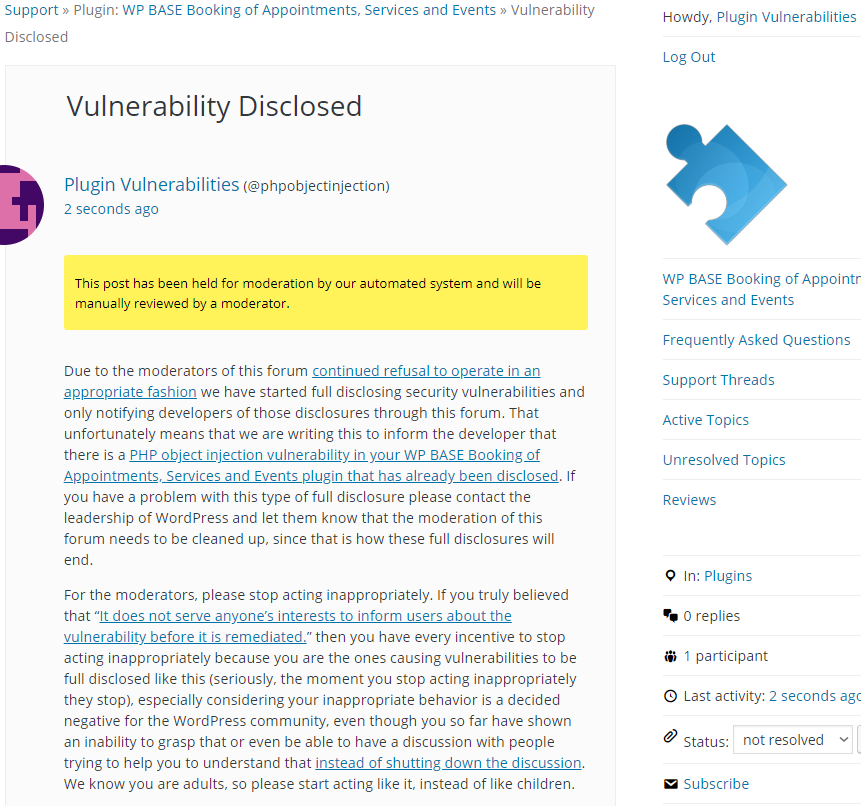Our Proactive Monitoring Caught a PHP Object Injection Vulnerability in WP BASE Booking of Appointments, Services and Events
One of the ways we help to improve the security of WordPress plugins, not just for the customers of our service, but for everyone using them, is our proactive monitoring of changes made to plugins in the Plugin Directory to try to catch serious vulnerabilities. Through that we caught a PHP object injection vulnerability in the plugin WP BASE Booking of Appointments, Services and Events.
The possibility of this vulnerability is also flagged by our Plugin Security Checker, so you can check plugins you use to see if they might have similar issues with that tool. That tool flags the possibility of other issues in this plugin as well.
In the function get_userdata_from_cookie() in the file /includes/user.php the value of the cookie “wpb_userdata” is passed through the maybe_unserialize() function, which in turns passes it through the unserialize() function:
773 774 775 776 777 | public function get_userdata_from_cookie() { if ( empty( $_COOKIE["wpb_userdata"] ) ) return array(); $data = maybe_unserialize( wp_unslash( $_COOKIE["wpb_userdata"] ) ); |
With the right value set to that cookie that can then cause PHP object injection to occur.
As the proof of concept below shows, that function is run on pages with the plugin’s shortocde “app_book” when visited by someone not logged in to WordPress. It probably runs elsewhere as well.
The function get_apps_from_cookie() in the file /includes/core.php has similar code.
Full Disclosure
Due to the moderators of the WordPress Support Forum’s continued inappropriate behavior we are full disclosing vulnerabilities in protest until WordPress gets that situation cleaned up, so we are releasing this post and then leaving a message about that for the developer through the WordPress Support Forum. You can notify the developer of this issue on the forum as well. Hopefully the moderators will finally see the light and clean up their act soon, so these full disclosures will no longer be needed (we hope they end soon). You would think they would have already done that, but considering that they believe that having plugins, which have millions installs, remain in the Plugin Directory despite them knowing they are vulnerable is “appropriate action”, something is very amiss with them (which is even more reason the moderation needs to be cleaned up).
Update: To clear up the confusion where developers claim we hadn’t tried to notify them through the Support Forum (while at the same time moderators are complaining about us doing just that), here is the message we left for this vulnerability:
Is It Fixed?
If you are reading this post down the road the best way to find out if this vulnerability or other WordPress plugin vulnerabilities in plugins you use have been fixed is to sign up for our service, since what we uniquely do when it comes to that type of data is to test to see if vulnerabilities have really been fixed. Relying on the developer’s information, can lead you astray, as we often find that they believe they have fixed vulnerabilities, but have failed to do that.
Proof of Concept
With our plugin for testing for PHP object injection installed and activated, set the value of the cookie “wp_base_session” to “O:20:”php_object_injection”:0:{}” and then when visiting a page with the “app_book” shortcode when not logged in the message “PHP object injection has occurred.” will be shown.
